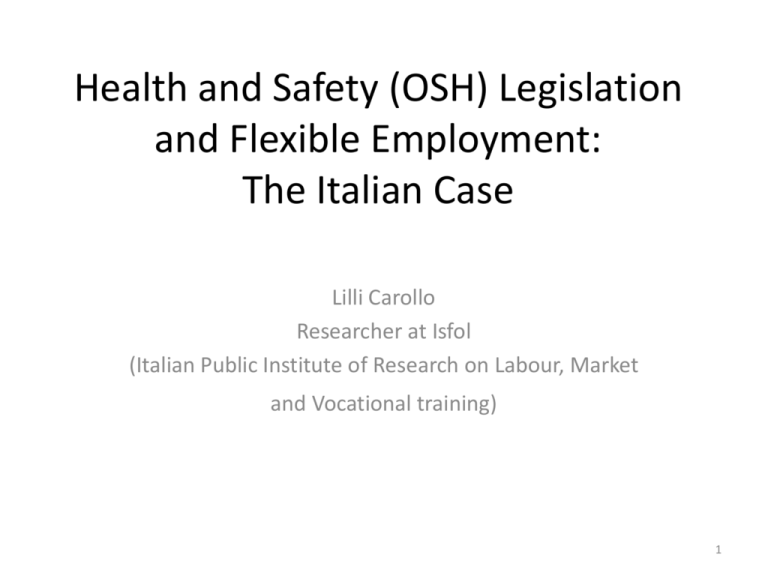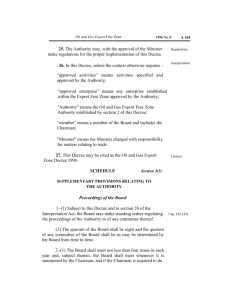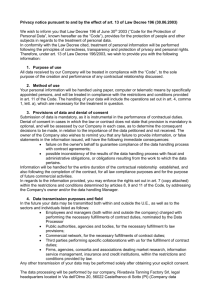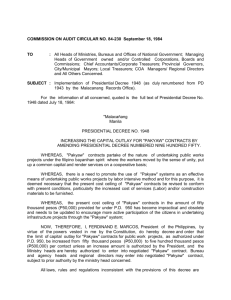presentation
advertisement

Health and Safety (OSH) Legislation and Flexible Employment: The Italian Case Lilli Carollo Researcher at Isfol (Italian Public Institute of Research on Labour, Market and Vocational training) 1 Why study health and safety with reference to flexible employment • Employees hired with non-standard forms of work are exposed to a greater risk of accidents on the job with respect to standard employees because they lack what psychologists call “perception of potential risks in the workplace” • “Non-standard forms of work” - an official definition of NSFW doesn’t exist: Typically, NSFW covers work that falls outside the scope of a standard employment relationship, which itself is understood as being work that is full-time, indefinite employment in a subordinate employment relationship (ILO, 2015). • Priority groups (people with disabilities, aging workers, migrants, women and young people) are often hired to perform non-standard forms of work 2 The new flexible employment rules and the latest Health and Safety Legislation • All the Italian labor laws are under review. The Law Proposal 183/2014 sets forth several different decrees. I will speak about two of them today. • (1) Codification of non-standard forms of work – Legislative decree 81/2015; • (2) Health and Safety in the workplace, with the idea of simplification and functionality – we are still waiting for a draft, so we don’t know exactly what the legislators mean by simplification and functionality. 3 • Legislative decree 81/2015: Codification of nonstandard forms of work: 1. Part-time 2. On-call jobs 3. Fixed term contracts 4. Temporary agency work 5. Apprenticeships 6. Term employment contracts (selfemployment/freelance) • I would like to discuss three of these kinds of work: fixed term contracts, temporary agency work and apprenticeships. 4 The OSH legal framework • At present, in Italy we have Legislative Decree 81 of 2008, modified and integrated by two decrees of 2009 and 2013 to render the management of Health and Safety more simple and efficient. • We must read Legislative Decree 81/2008 in combination with Article 2087 of the Civil Code, which provides for the protection of the physical and moral integrity of employees and is the main source of such protection. It applies to any work organization, whether public or private, without regard to its dimensions. The employer is required to adopt all measures necessary to protect the physical integrity and moral personality of the employee. 5 Definition of “worker” in OSH • “Worker” can be defined as “a person who, regardless of the type of contract, held a job in the organization of a public or private employer, with or without pay, even for the sole purpose of learning a craft, art or profession, other than workers in the domestic and family field (...).” • The definition is very broad. The definition also includes “equated with” workers, internships, stages, volunteers, and workers hired with nonstandard forms of work (flexible employment). It is important to note that the definition in the Decree is more extensive than that in the Directive 89/391 because it applies to all the subjects functionally involved in the enterprise. 6 Promotion of health and safety at work: Restrictions on the use of flexible forms of work in the absence of risk assessment in the company • Companies must perform a risk assessment, which must be in writing and kept on-site. In 2009, the Legislature decided that the employer must consider all the risks connected to the specific non-standard form of employment. Without this document, an Italian employer is prohibited from entertaining non-standard forms of employment. The Supreme Court has held that, if an employer does not perform the required risk assessment, a fixed term contract can be converted by a judge into a contract for permanent employment. 7 The European Directive • In 1991, the European Legislator has introduced an integrative system of rules on OSH. In particular, there are “special” rules dealing with information, training, and medical surveillance. 8 1) Temporary Agency Work • This type of work involves both the temporary staff agency and the firm or user. Normally, under labor law, the employer is the agency, while for the OSH the user is the employer. 9 The Agency has the following duties: • Provide general information on the risks which may be present – The information must be provided orally and confirmed by written materials (signed by the worker for acceptance) – This is important for migrant workers because it should be provided in a language which is understandable to each worker and the Agency must send foreign workers to schools or public organizations in the territory which provide Italian language courses. Users must avail themselves of a cultural mediator to help them learn the Italian health and safety signs and measures used in the workplace. • Classroom and on-the-job training – On-the-job training includes use of the work equipment. – The Agency must provide training on how to use work equipment in general. • Communicate in writing to the worker the duties which he must perform, the presence of possible risks for his physical health and safety and the safety measures which he must adopt to prevent any risks. • These duties may be performed by the user if written in the temporary agency contract. 10 The User has the following duties: • all the duties of prevention and protection at work (Art. 3) • must observe all the duties of health and safety in the same way as for its other employees • the risk assessment must be performed also with regard to the presence of temporary employees, if the company intends to use this form of employment • the risk assessment must also include medical surveillance both prior to the beginning of the employment and periodically. The literature states that such medical surveillance should be performed by the physicians of both the Agency and the User. • Training: – Every worker must be trained when they are hired, transferred, or when there is a change of duties. – Training on the use of work equipment regarding the specific equipment used by the firm must be performed by the User. – On-the-job training must be performed on-site and not in a classroom. 11 Fixed-Term Contracts • Directive 383 of 1991 provides special rules for fixed term contracts and temporary agency work. • Decree 81 of 2008 does not provide any singular rule but extends its application to all dependent workers, so it also applies to fixed-term workers. • With regard to worker information, we have to refer to the general Article 36 of Legislative Decree of 9 April 2008, n. 81. The decree requires that the information be “adequate” and addressed to “each worker.” This means that the employer must relate the information to any work situation (individual or group of workers), including fixed-term workers. • In reference to training, as mentioned, it can be assumed that the Legislative Decree of 6 September 2001, n. 368, has properly transposed Directive n. 91/383/EC. Thus, Article 7, paragraph 1, taking the provisions of Article 4 of the Directive, provides that “a worker employed under a fixed-term contract must receive adequate and appropriate training to the characteristics of the tasks of the contract, in order to prevent specific risks associated with the execution of the work.” 12 • I must add that, unfortunately, the Legislative Decree n. 81/2015 does not provide for a specific rule on training for fixed-term contracts. • Even with regard to medical surveillance, we must refer to the general rules set out in Article 38 of Legislative Decree of 9 April 2008, n. 81. • However, there is no specific rule governing the institution of “special” medical surveillance in the legislative decree governing fixed-term contracts. The Italian law thus lacks a special character regarding medical surveillance which it seems that the European legislators intended, inferring from their use of the phrase “special medical surveillance” (art. 5 Directive n. 91/383/EEC). 13 Health and safety in Apprenticeship job contracts • Legislative Decree n. 167, dated 14 September 2011 (as well as Legislative Decree n. 276, dated 10 September 2003, which has innovated the discipline), does not expressly provide rules on prevention in the workplace. Neither does the Legislative Decree n. 81/2015. • However, from the definition of “worker” provided by Legislative Decree n. 81/2008, as a “person who, regardless of the type of contract, has a job within the organization of a public or private employer, with or without subordination, but only in order to learn a craft, an art or a profession,” it is clear that the entire issue of health and safety contained in the above-mentioned Legislative Decree applies to the apprentice. 14 • The courts, however, have intervened to point out that the preventative obligations of the employer of the apprentice shall, in relation to information and training, be more stringent, given the inexperience of the young worker. • In fact, OSHA expressly states that “young people should be given safe and healthy jobs that are within their capabilities. They require proper training and supervision. They need to be actively engaged if they are to take on board the safety culture of their workplace and cooperate on OSH matters; it is not enough to simply provide them with a handbook of safety rules”. 15 Conclusions • The Legislator has, over the years, taken careful steps to develop prevention in the workplace for workers employed with non-standard forms of work. An approach which identifies and anticipates emerging risks related to non-standard forms of work is always necessary. • Nevertheless, it seems that the Legislator has not been able to take this opportunity to introduce adequate protection to respond in a “differential” way to the different needs raised by each type of flexible contract, also failing to take into account atypical or nonstandard models of employment for an indefinite period. 16 • Nevertheless, a mere reference to the application of general provisions is not enough to ensure effective protection of workers “temporarily involved” in the enterprise, as demonstrated with reference to the fixed-term contract. A specific discipline to protect workers is necessary for each type of contract. • Those facts are not taken into account by the Decree n. 81/2015 which, actually, does not recall the content of Legislative Decree 368/2001 on the training of fixedterm workers. In so doing, it leaves a gap in the legal system. 17







